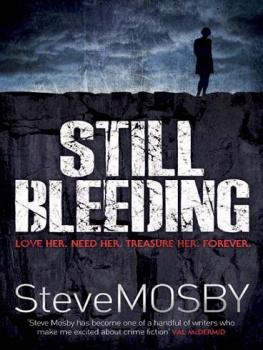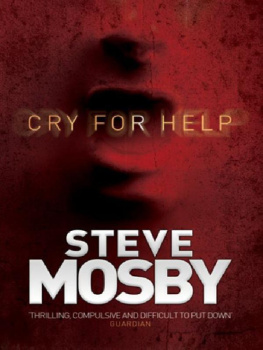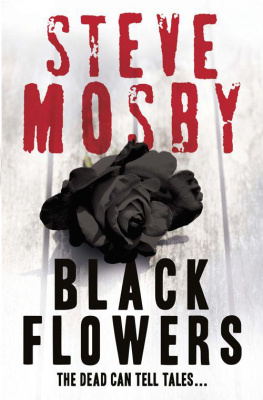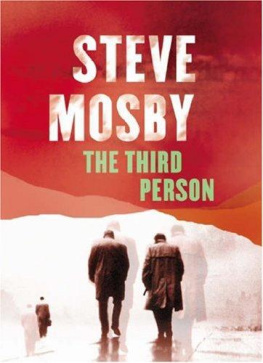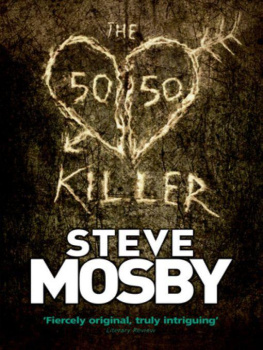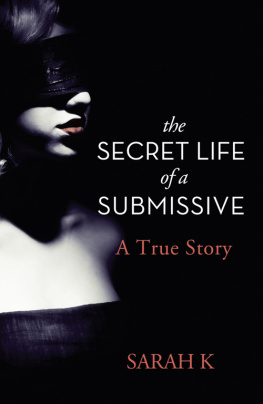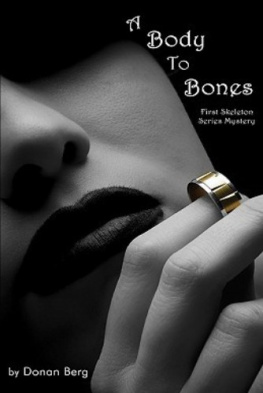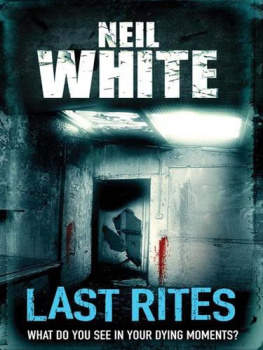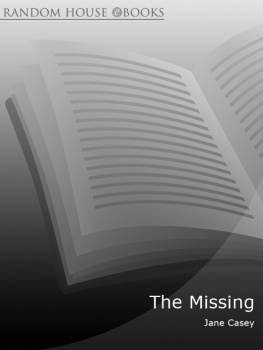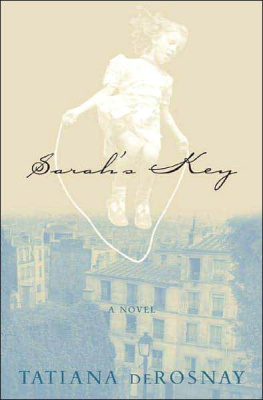Still Bleeding
Steve Mosby
First published in Great Britain in 2009 by Orion Books,
an imprint of The Orion Publishing Group Ltd
Orion House, 5 Upper Saint Martin's Lane
London wc2h 9ea
An Hachette UK Company
13 579 10 8642
Copyright Steve Mosby 2009
The moral right of Steve Mosby to be identified as the author
of this work has been asserted in accordance with
the Copyright, Designs and Patents Act of 1988.
All rights reserved. No part of this publication may be reproduced, stored in a retrieval system, or transmitted
in any form or by any means, electronic, mechanical, photocopying, recording, or otherwise, without the
prior permission of both the copyright owner and the
above publisher of this book.
All the characters in this book are fictitious, and any resemblance
to actual persons living or dead is purely coincidental.
A CIP catalogue record for this book
is available from the British Library.
ISBN (Hardback) 978 1 4091 0108 6
ISBN (Trade Paperback) 978 1 4091 1009 5
Typeset at The Spartan Press Ltd,
Lymington, Hants
Printed and bound in the UK by CPI Mackays,
Chatham ME5 8TD
The Orion Publishing Group's policy is to use papers that
are natural, renewable and recyclable products and made
from wood grown in sustainable forests. The logging
and manufacturing processes are expected to conform to
the environmental regulations of the country of origin.
For Lynn
Acknowledgements
Thanks, as usual, go to my agent, Carolyn Whitaker, and all the people at Orion who have contributed to this book with their insights, advice and, most of all, patience. Especially Genevieve, Jon and Jade, and all the people - genuinely too numerous to name, but you all know who you are - who helped make the previous books such a success. I really can't thank you enough.
In addition, thanks to a few people I forgot last time around: Sophie Hannah, James Nash and Tom Palmer. And Val McDermid for kind words and support.
More personal thanks for general support and friendship go to the usual crowd: Neil and Helen; Keleigh and Rich; J and Aug; Gill and Roger; Ben and Megan; Cass and Mark; Emma Undley; the Sociology lot; Mum, Dad and John; and everyone who wrote to me over the last year to say they liked the other ones and were looking forward to this.
Most of all - as always - thanks to Lynn, for your love and encouragement.
Residents of Leeds will notice a few key locations have been mangled to fit the entirely fictional geography of the city in the book, and one conversation within refers very loosely to the activities of a real Art collective, the 'Leeds 13'.
On a much darker note, aside from key plot elements, it should be recorded that the videos and images Alex encounters in the book are based on actual footage freely available online. It can be a scary world out there.
Prologue
The last time I saw my wife was one evening in January, two and a half years ago. Marie was twenty-six years old, wearing a black jacket and dark-blue jeans, and she was on her way to buy a bottle of wine to go with the dinner I was stirring. She walked through the kitchen and opened the front door, casually swinging her car keys, but then hung back and said:
'Do you need anything else while I'm out?'
I shook my head. 'Just you to come back to me.'
She didn't reply, but I could hear it in the silence:
Are you sure that's what you need?
We'd had a difficult couple of weeks. For as long as I'd known her, Marie had been prone to bouts of depression: periods of time where everything I said or did was wrong, followed by periods where all she'd do was apologise, hate herself and wonder what I saw in her and why I stayed. I wasn't sure which of the two I found hardest, but we were between stages right now. Everything seemed much better than it had for the last few days, but the atmosphere between us was awkward.
I looked at her and the blankness on her face made me ache inside. I wish you could see how beautiful you are, I thought. I wish you could just see that. But I didn't say it, because I knew she wouldn't accept the words. They would drift past, and the frustration of not getting through would only make me feel bad, which would then make her feel worse. Sometimes, she was so determined not to be loved.
'Just that,' I said.
She nodded, her face still blank. 'Quick kiss, then.'
I left the spoon balanced and walked over.
'You want me to go instead?'
'No, it's fine,' she said. 'I love you.'
If I now remember those words being grabbed at - said a little too quickly - then I didn't notice it at the time.
'I love you too.'
She closed the door behind her. A minute later, I heard the car start up and drive away.
I was an introspective man back then. Prone to worrying. I'd imagine scenarios, always turning them around in my head to find the worst possible angle, then forcing myself to explore it. Whenever Marie was late back from work, I'd start to think that something terrible had happened to her. What if she doesn't come back? The minute hand on the kitchen clock would become a key turning slowly in my head, unlocking one awful possibility after another, so that they fell into my mind like coins. Late at night, I'd lie next to her and wonder what it would be like for one of us to lose the other.
I don't know why I was like this, because nothing bad had ever really happened to me. Perhaps that's why.
On that day, she should have been ten minutes at most. The shop she was heading to was only up the road, and for some reason I wasn't worried at all. You like to think you'd know, but the truth is that you don't. So the food simmered gently, and I kept on stirring it, the wooden spoon knocking against the base of the pan, and I was oblivious to the fact the world had quietly shattered without my noticing.
I can't remember when I started to think bad thoughts, but I know it was exactly forty minutes after she left when I decided right, that's enough, and called her mobile.
It was answered by a policeman. In the background I could hear sirens and a rush of traffic, and, straight away, I knew that this time something really had happened. In times of crisis, some part of your subconscious often takes charge, and I was shockingly calm as I spoke to him. It was only afterwards, as I grabbed my coat, that I realised I'd barely taken in a word he'd said, and that the ones I had didn't make any sense.
Marie had been hit by a truck, he'd said, on the ring road that circled the city. I'd taken that to mean there had been a car accident, but then I realised she shouldn't have been anywhere near the ring road. And some other phrase he'd used implied she wasn't in her car when it happened. Later, at the police station, I got the full account, and those things clicked into place. It hadn't been the truck that killed her. Most likely, it had been the fall from the bridge, fifty feet above, where they found her car.
The police always described it as the fall, never the leap, but that word was generally there in the tone of voice of whoever was speaking to me at the time. I heard the judgement attached to it. The sense that my loss was somehow not as great as the loss suffered by others.
In general, people talk about suicide in two different ways. Either they have sympathy for the person who kills themselves and think it's a tragedy, or else they see it as the ultimate in selfish behaviour. Some people probably do a bit of both. I know all that, so I found it easy to understand the attitude of the police. The truck driver, they told me, could have been killed. As things stood, he might never recover from what he'd seen that day.

